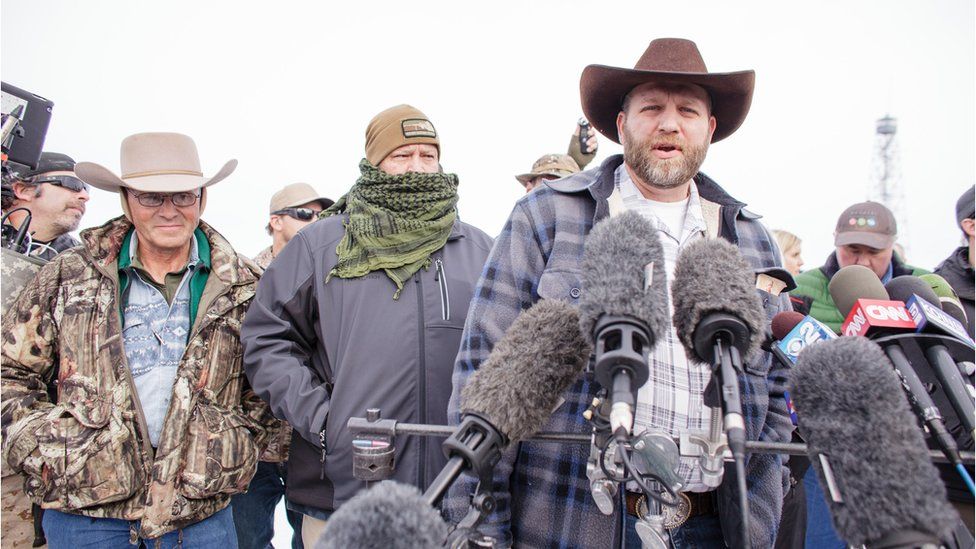Oregon stand-off: Wildlife refuge occupiers in shock acquittal
- Published

Seven leaders of an armed militia who led a 41-day stand-off at a US federal wildlife refuge in Oregon have been cleared of the charges against them.
The surprise verdict acquitted them of conspiracy and firearms offences.
A lawyer for one of the leaders, Ammon Bundy, was tackled to the ground by US marshals after shouting at the judge.
The militia occupied the refuge in early January, accusing the government of unlawful interference in the affairs of ranchers.
One protester was shot dead by police during a confrontation outside the refuge when some of the defendants were arrested, days before the occupation was brought to a peaceful end in February.
The stand-off highlighted the simmering resentment among rural communities in the US West over federal control of land.
A total of 26 people have been charged over the stand-off. Some have already pleaded guilty to conspiracy.
A second group of defendants is due to stand trial in February.
Prosecutors argued the defendants, led by Ammon Bundy and his brother Ryan, had kept federal employees from their jobs at the Malheur National Wildlife Refuge.
But defence lawyers say the jury was unable to find beyond reasonable doubt that the occupiers had intended to prevent federal officers from going to work.
Supporters of the defendants celebrated outside the courthouse on Thursday
Drama erupted in the courtroom after Ammon Bundy's defence lawyer Marcus Mumford shouted at the judge, demanding the immediate release of his client. As the exchange escalated, court marshals tackled him to the ground and used a stun gun on him.
Judge Anna Brown said Mr Bundy could not be released because he and his brother still faced charges in a separate armed stand-off case at their father's ranch in Nevada in 2014.
Lawyers for the defendants expressed their surprise at the verdict, including Robert Salisbury who described it as a "stunning victory for the defence".
'Extremely disappointed'
Alongside the Bundy brothers, Jeff Banta, Neil Wampler, Kenneth Medenbach, David Fry and Shawna Cox were all cleared of the charges.
During the occupation earlier this year, the group established armed patrols and vetted those who visited the refuge. They said the takeover was a justified act of civil disobedience against an overreaching federal government.
After several weeks one of the protesters, Robert "LaVoy" Finicum, was shot dead during a 26 January traffic stop outside the refuge as the Bundys and several others were detained.
After the acquittals, US Attorney for the District of Oregon Billy Williams said he had "hoped for a different outcome".
But he said he strongly believed the case needed to be brought before a court and decided by a jury.
The FBI also said it was "extremely disappointed in the verdict".
'A slap in the face for the feds' - Analysis by James Cook, North America correspondent
Friends of the occupiers - and there are plenty of them in the western United States - will trumpet this verdict as a victory for freedom in the face of federal oppression.
The rationale behind the protest was the charge that the US government acts unconstitutionally in its treatment of ranchers.
A bird sanctuary established by President Theodore Roosevelt in 1908 might not have been the most obvious symbol of such "oppression", but in truth it was an easy, empty target for the heavily-armed militia.
Indeed, the lack of resistance may have helped to secure their acquittal. How could the occupiers have impeded US Fish and Wildlife Service workers "by force, intimidation, and threats," if they walked in to the reserve unchallenged?
Whether the jury acquitted them on such technical grounds or whether it was striking a blow for states' rights is impossible to know at this stage. Still, both interpretations amount to the same thing: a slap in the face for the feds.
The Oregon stand-off explained
How did it begin?
In October last year, a federal judge ruled that sentences on two Oregon ranchers, Dwight and Steven Hammond, for burning federal land were too short and jailed them for about four years each.
Angered by the ruling, Nevada native Ammon Bundy began a social media campaign backing them and travelled to Burns, Oregon, organising meetings.
His group attracted supporters from across a number of states and Mr Bundy called it Citizens for Constitutional Freedom.
On 2 January the armed militiamen took over the Malheur National Wildlife Refuge - and widened their range of demands.
What were the militia's aims?
It was an extension of the Sagebrush Revolution of the 1970s and 1980s that demanded the transfer of federal land in many Western states to local control.
Mr Bundy's own father - a Nevada rancher - had been involved in a protest over cattle-grazing rights in 2014. One policy is to try to persuade ranchers to tear up their federal grazing contracts.
Although many local residents were sympathetic with the cause, many also opposed the occupation of the refuge.
Even the local ranchers who are serving the longer sentences distanced themselves from the militia.
Are militias legal?
The term has a complex history and generally refers to those outside the official military who can be called on in times of need.
The US constitution refers to the president having command of "militia of several states" and that Congress "can call forth militia" to tackle insurrection and invasion.
Those who form such militias cite the constitution and various references in federal and state law as granting them legality.